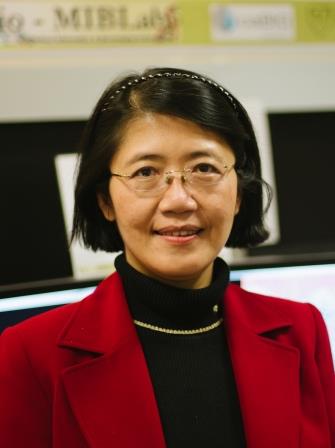IEEE EMBS Distinguish Lecture by Dr. May D. Wang: Making Sense of Big Data Integrated Biomedical and Health Informatics for Personalized Care
 |
- Speaker: Dr. May D. Wang
- Date: Friday, June 6, 2014
- Time: 15:30
- Location: Lecture Hall E.126, IMETUM, Garching
|
Abstract
Rapid advancements in biotechnologies such as –omic (genomics, proteomics, metabolomics, lipidomics etc.), next generation sequencing, bio-nanotechnologies, molecular imaging, mobile and wearable sensors etc. give hope that personalized, predictive, preventive, and participatory health will become a reality. I have been working on biomedical Big Data analytics, especially “Integrated Translational Biomedical and Health Informatics (BHI) for Personalized and Predictive Health”. I have focused on how to analyze and interpret huge amounts of heterogeneous multi-modal multi-scale (i.e. molecular, cellular, patient, and healthy individual) biomedical data for discovery, development, and delivery in human health care such as (1) bioinformatics that extracts personalized biomarkers from genomics and proteomics data acquired by next generation sequencing and mass spec technologies; (2) biomarker-based tissue imaging informatics for clinical decision support to improve diagnosis accuracy for the next generation pathology; and (3) health informatics for treatment in clinic and health condition monitoring and behavior change in Personalized Health Record (PHR). PHR provides optimal evidence-based care for individual health.
I will demonstrate case studies on how to take multiple informatics steps from data quality control, information feature extraction, advanced knowledge modeling, to decision making, and proper action taking through feedback for acute (e.g., ICU), chronic (e.g., asthma, diabetes, brain injury) and genetic diseases (e.g., sickle cell disease) monitoring and treatment, including (1) caCORRECT that improves genomics data quality; (2) omniBiomarker that identifies biomarkers from high throughput –omic data based on clinical knowledge; (3) Q-IHC that quantifies multiplexing in vitro diagnostic QD imaging data; (4) [TissueWiki] that archives and analyzes multi-terabytes of raw and meta-information from Immunohistochemistry (IHC) data captured in Human Protein Atlas (HPA); tissue imaging mass spectrometry (IMS) data from Georgia Tech’s Center of Imaging Mass Spectrometry; and high resolution multiplexed Quantum Dots (QD) imaging data from Emory-Georgia Tech Cancer Nanotechnology Center; and (5) health informatics systems [icuARM], [SickleREMOTE], [SickleSAM], [MotionTalk] et al. co-developed by Georgia Tech, Emory University, Children’s Healthcare of Atlanta (CHOA), Emory, and Shepherd Center etc. to provide health decision support for improved care outcome.
Bio
May D. Wang, Ph.D. is an Associate Professor in the Joint Department of BME, School of ECE, Winship Cancer Institute, Institute for Bioengineering and Bioscience, and Institute for People and Technology at Georgia Institute of Technology and Emory University. She is a Georgia Research Alliance Distinguished Cancer Scholar, Director of Biocomputing and Bioinformatics Core in Emory-Georgia Tech Cancer Nanotechnology Center, a Co-Director of Georgia-Tech Center of Bio-Imaging Mass Spectrometry, and an active participant in FDA-led Microarray Quality Control and Sequencing Consortium (MAQC-SEQC). Dr. Wang received [PhDEE], MSCS, MS-Applied Math, and MSEE from Georgia-Tech, and B.S.Eng from Tsinghua University. She had 3~4 years of industrial R&D experience before academic professorship.
Currently, Prof. Wang’s research is on Big Biomedical Data Analytics, esp. on Biomedical and Health Informatics (BHI) for Personalized and Predictive Health. Dr. Wang published 150+ articles in peer-reviewed conference proceedings and journals (e.g. Nature Protocols, Proceedings of National Academy of Sciences, Journal of American Medical Informatics Association, Annual Review of Medicine, BMC Bioinformatics, Briefings in Bioinformatics, BMC Medical Imaging, Pathology Informatics, IEEE Proceedings, IEEE Transactions on Informatics Technology in Biomedicine, IEEE Journal of Biomedical and Health Informatics, IEEE Reviews on Biomedical Engineering, Annals of Biomedical Eng, and Trends in Biotechnology). She had a few tools certified by NIH/National Cancer Informatics Program as silver-level compatible. Dr. Wang is currently serving as the Senior Editor of Journal of Biomedical and Health Informatics (J-BHI), a 2014-2015 Distinguished Lecturer of IEEE Engineering in Medicine and Biology Society (IEEE-EMBS), Chair of Steering Committee for IEEE-EMBS Special Topic Conference on BHI, and a Co-Chair of Technical Committee on BHI.


